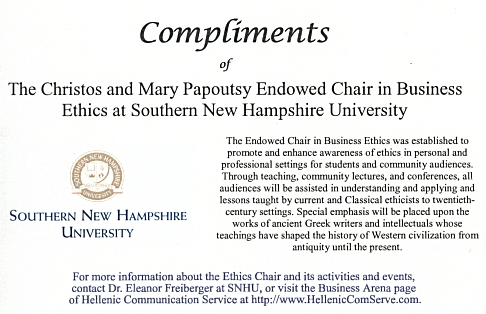
Dealing with Dirty Money A Statement by the Caux Round Table The Caux Round Table (CRT) was founded in 1986 by Frederik Philips, former President of Philips Electronics, and Olivier Giscard d’Estaing, Vice-Chairman, INSEAD, and now includes global business leaders from North and South America, Europe and Japan. The CRT’s attention is focused on the importance of global corporate responsibility in reducing social and economic threats to world peace and stability. The CRT recognizes that ethical leadership from the private sector is a precondition for achieving better outcomes from globalization. The International Monetary Fund places global money laundering at $600 billion to $1.5 trillion a year, with perhaps a midrange figure of $1 trillion annually offering a rough, working estimate. Even within an order of magnitude of such an estimate, this constitutes the biggest loophole in the free-market system. It also constitutes the most damaging economic condition hurting developing and transitional economies. Perhaps half of global cross-border money laundering, in the hundreds of billions of dollars yearly, passes out of such countries, which comprise 80 percent of the world’s population. It drains hard currency reserves, heightens inflation, depresses tax collection, cripples health and education services, saps investment and reduces growth. It contributes to failed states, seedbeds of terrorism. And, at several times more than the total of foreign aid, it undermines the value of development assistance provided to the global poor. We note with satisfaction steps already taken to address illicit financial proceeds. The Wolfsberg Principles on anti-money laundering and on blocking terrorists’ resources have been adopted by eleven leading international banks. The Financial Action Task Force has identified non-cooperative countries and territories in the fight against money laundering. And the Organization of Economic Cooperation and Development has adopted a strong anti-bribery convention. Many important aspects of this worldwide problem, however, remain unaddressed. There are three forms of dirty money that cross borders – criminal, corrupt and commercial. The criminal component is narrowly defined in the laws of many nations to refer to the inflow of money which derives from drugs, terrorism, crimes of violence and sometimes bank fraud. The corrupt component is money accumulated through bribery and theft by government officials. The commercial component is money which intentionally and illegally evades taxes in the countries out of which it comes. In the laws of most nations, it is legally acceptable to facilitate and handle money arriving from abroad generated from many forms of criminal activity and, in almost all cases, from the proceeds of commercial tax evasion. As a consequence of these inflows, Treasury Department officials in the United States estimated that 99.9 percent of the foreign criminal and terrorist money which U.S. laws attempt to stop instead gets easily deposited into secure accounts. Officials in key European countries made similar estimates for their jurisdictions. The idea at the core of anti-money laundering efforts is flawed. The notion that nations can successfully protect themselves from a narrow range of dirty money not wanted, while at the same time facilitating a much broader range of dirty money that is acceptable, is unworkable. We at the CRT urge all governments, with leadership particularly emanating from the G-8 nations and from members of the OECD, to adopt measures to curtail the flow of dirty money in all its forms – criminal, corrupt and commercial. We urge that anti-money laundering legislation be promptly extended to include handling all three forms of such illicit proceeds. We urge prompt action to close access by financial-secrecy jurisdictions, money-laundering centers and shell banks to clearing-house systems. And we urge that enhanced measures be adopted by financial institutions and corporations to ascertain the legitimate origin of proceeds in cross-border transactions. For security, for poverty alleviation and to spread the benefits of globalization, we believe that international commercial and financial operations must proceed in accordance with the highest ethical standards. Much work remains to be done on these issues, and the most important step we can take at this stage is to place the whole of the problem of illicit dealings on the political-economy table for forthright action. The Caux Round Table calls for action and pledges its assistance in these vital efforts.
|
|

